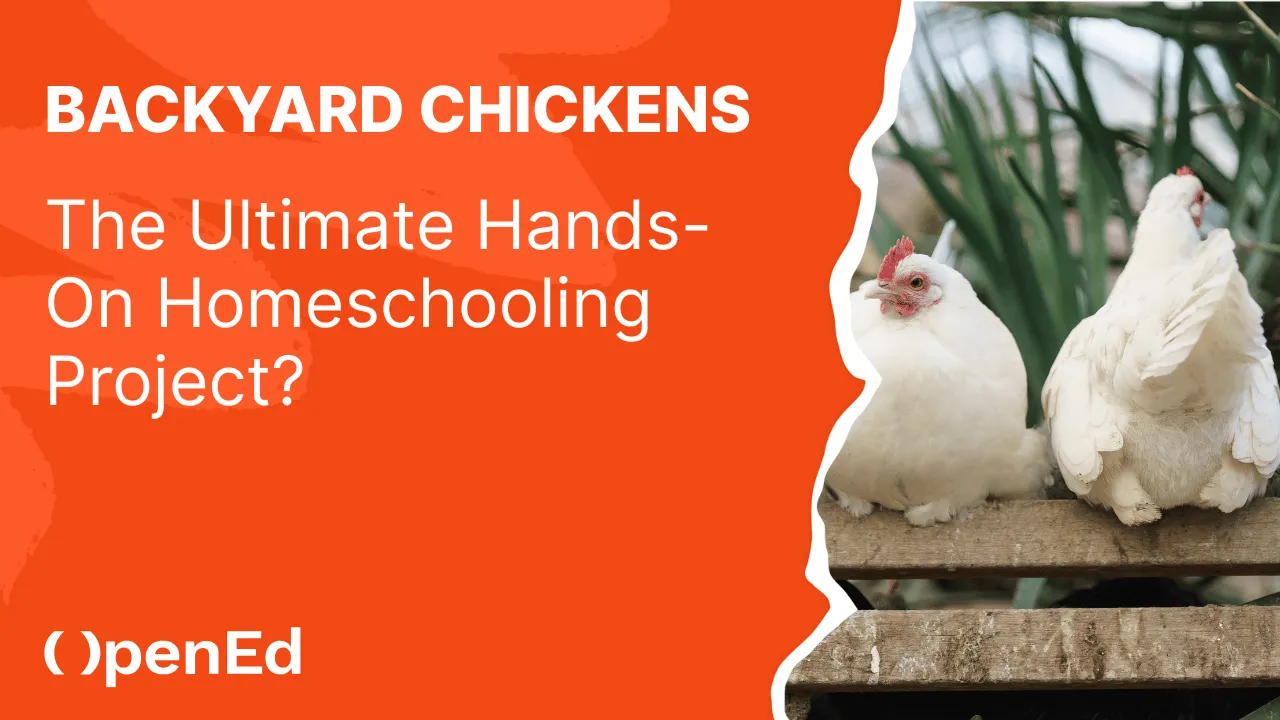
🐴 Hands-on learning (backyard chickens edition)
🐴 Hands-on learning (backyard chickens edition)
🐴 Hands-on learning (backyard chickens edition)

Join us Tuesday, May 13 at 12:30pm MT for a 45-minute live Q&A launch event for our new book – Open Education: How to Reimagine Learning, Ignite Curiosity, and Prepare Your Kids for Success.
IN THIS EDITION:
🍎 Why chicken keeping creates natural opportunities for hands-on learning
🍎 How OpenEd families use chicken projects to teach practical math, science, and business skills
🍎 Our quick-start guide for setting up your own backyard flock
💡 THOUGHT | 📊 TREND | 🔨 TOOL
Backyard Chickens: The Ultimate 3-in-1 Learning Lab
Today’s OpenEd Daily is a hybrid Thought-Tool-Trend. If you enjoy this edition, forward this email to a friend! First time reading? Subscribe and learn more at OpenEd.co.
It all started with an innocent question in our staff Slack channel: "Any resources for raising chickens?"

What followed was a chicken enthusiast flash mob. Our staff emerged with passionate testimonials—one had "raised chickens since [she] was little," another's golden layers "laid almost daily" through winter, and a third shared local Facebook groups that saved her flock.
With egg prices rivaling college tuition and families seeking more screen-free learning options, backyard chicken keeping has transformed from quirky hobby to popular project-based learning opportunity. Furthermore, as blogger Forest Rose puts it, "[B]ackyard chickens revolutionize education by blending hands-on experiences with academic concepts."

You can read our full guide to Backyard Chickens: The Ultimate Hands-On Homeschooling Project, or enjoy this condensed summary.
Four Reasons Chicken Learning Sticks
We know that children retain less information when they read it compared with personally experiencing the lessons. Chicken projects create ideal learning conditions:
- Real stakes. When predators threaten the coop, motivation isn't artificial.
- Natural subject integration. Chicken keeping blends math (calculating coop dimensions), science (understanding egg production), and business (selling excess eggs).
- Emotional investment. Even homework-resistant children eagerly take responsibility for creatures that depend on them.
- Immediate feedback. If a coop design fails, rain gets in. These consequences create learning loops tighter than any worksheet's two-week return policy.
We See It Working
A first-grader in the OpenEd program proudly reports in his learning logs about collecting eggs daily and caring for both chicks and mature hens. Meanwhile, a fourth-grader has taken her chicken project to the next level, documenting how she "has begun packaging and selling her organic chicken eggs and worked on a business plan."
So what do you need to get started?
Quick-Start Checklist:
- Check local regulations (Social Studies/Government) - Most municipalities limit flock size (typically 3-6 birds) and may restrict roosters
- Choose chicks or mature hens (Economics) - Compare startup costs, ROI timelines, and long-term value between chicks ($3-5 each plus supplies) vs. mature hens ($15-25 each)
- Select beginner-friendly breeds (Biology/Genetics) - Study inherited traits in Buff Orpingtons (the "golden retrievers of chickens"), Rhode Island Reds, or Easter Eggers (for colorful eggs)
- Create proper housing (Math/Engineering) - Calculate square footage, measure materials, and design a coop with predator protection, weather protection, ventilation, roosts, nesting boxes, and adequate space
- Track egg production (Data Science) - Create spreadsheets to monitor laying patterns, feed costs, and seasonal variations
- Chase escaped chickens (Physical Education) - Who needs a gym membership when you have a flock of free-range escape artists?
For More Advanced Projects:
- Incubation and hatching (rental programs like Utah's "Hatch@Home" offer complete experiences without the upfront investment)
- Genetic breeding experiments
- Egg entrepreneurship
Recommended Resources
- "A Kid's Guide to Keeping Chickens" by Melissa Caughey – Specifically written for children with age-appropriate projects
- Roost & Root blog - Beginner-friendly articles recommended by our staff
- Kingdom First Homeschool - Forest Rose's comprehensive guide to chicken-based homeschooling
- "The Chicken Health Handbook" by Gail Damerow – Detailed reference for health issues
- Fresh Eggs Daily - Natural chicken keeping methods and herbal supplements
Videos
- Backyard Chickens for Kids - Mr. Homeschool - Step-by-step tutorials
- Chickens! Learn About Chickens - Basic chicken facts for younger children
- BackyardChickens.com - Mentioned by multiple staff members as the most comprehensive resource
Lesson Plans
- Iowa Agriculture Literacy Foundation - "Caring for Chickens" lesson plan for 3rd graders
- University of Illinois Extension - Free incubation and embryology lessons for elementary and middle schoolers
- Run Wild My Child - Guides for integrating children in chicken projects
Want to learn more? Read our full guide: Backyard Chickens: The Ultimate Hands-On Homeschooling Project
MEME OF THE DAY

That’s Ziggy Scramblepants to you!
That’s all for this week!
– Charlie (the OpenEd newsletter guy)
Subscribe to The OpenEd Daily
Join 20,000+ families receiving curated content to support personalized learning, every school day.
.webp)
.avif)


.png)
.png)
.png)